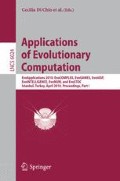Abstract
This paper describes the design, implementation and results of an evolutionary bot inside the PC game UnrealTM, that is, an autonomous enemy which tries to beat the human player and/or some other bots. The default artificial intelligence (AI) of this bot has been improved using two different evolutionary methods: genetic algorithms (GAs) and genetic programming (GP). The first one has been applied for tuning the parameters of the hard-coded values inside the bot AI code. The second method has been used to change the default set of rules (or states) that defines its behaviour. Both techniques yield very good results, evolving bots which are capable to beat the default ones. The best results are yielded for the GA approach, since it just does a refinement following the default behaviour rules, while the GP method has to redefine the whole set of rules, so it is harder to get good results.
Supported in part by the MICYT projects NoHNES (TIN2007-68083) and TIN2008-06491-C04-01, and the Junta de Andalucía (P06-TIC-02025 and P07-TIC-03044).
Access this chapter
Tax calculation will be finalised at checkout
Purchases are for personal use only
Preview
Unable to display preview. Download preview PDF.
References
Booth, T.L.: Sequential Machines and Automata Theory, 1st edn. John Wiley and Sons, Inc., New York (1967)
Cho, B.H., Jung, S.H., Seong, Y.R., Oh, H.R.: Exploiting intelligence in fighting action games using neural networks. IEICE - Trans. Inf. Syst. E89-D(3), 1249–1256 (2006)
Goldberg, D.E.: Genetic Algorithms in search, optimization and machine learning. Addison-Wesley, Reading (1989)
Koza, J.R.: Genetic Programming: On the programming of computers by means of natural selection. MIT Press, Cambridge (1992)
Michalewicz, Z.: Genetic Algorithms + Data Structures = Evolution Programs, 3rd edn. Springer, Heidelberg (1996)
Priesterjahn, S., Kramer, O., Weimer, A., Goebels, A.: Evolution of human-competitive agents in modern computer games. In: IEEE Congress on Computational Intelligence, CEC 2006, pp. 777–784 (2006)
Small, R., Bates-Congdon, C.: Agent Smith: Towards an evolutionary rule-based agent for interactive dynamic games. In: IEEE Congress on Evolutionary Computation, CEC 2009, May 2009, pp. 660–666 (2009)
Soni, B., Hingston, P.: Bots trained to play like a human are more fun. In: IEEE International Joint Conference on Neural Networks, IJCNN 2008, IEEE World Congress on Computational Intelligence, pp. 363–369 (June 2008)
Wikipedia: Unreal — wikipedia, the free encyclopedia (2009), http://en.wikipedia.org/wiki/Unreal
Author information
Authors and Affiliations
Editor information
Editors and Affiliations
Rights and permissions
Copyright information
© 2010 Springer-Verlag Berlin Heidelberg
About this paper
Cite this paper
Mora, A.M. et al. (2010). Evolving Bot AI in UnrealTM . In: Di Chio, C., et al. Applications of Evolutionary Computation. EvoApplications 2010. Lecture Notes in Computer Science, vol 6024. Springer, Berlin, Heidelberg. https://doi.org/10.1007/978-3-642-12239-2_18
Download citation
DOI: https://doi.org/10.1007/978-3-642-12239-2_18
Publisher Name: Springer, Berlin, Heidelberg
Print ISBN: 978-3-642-12238-5
Online ISBN: 978-3-642-12239-2
eBook Packages: Computer ScienceComputer Science (R0)

